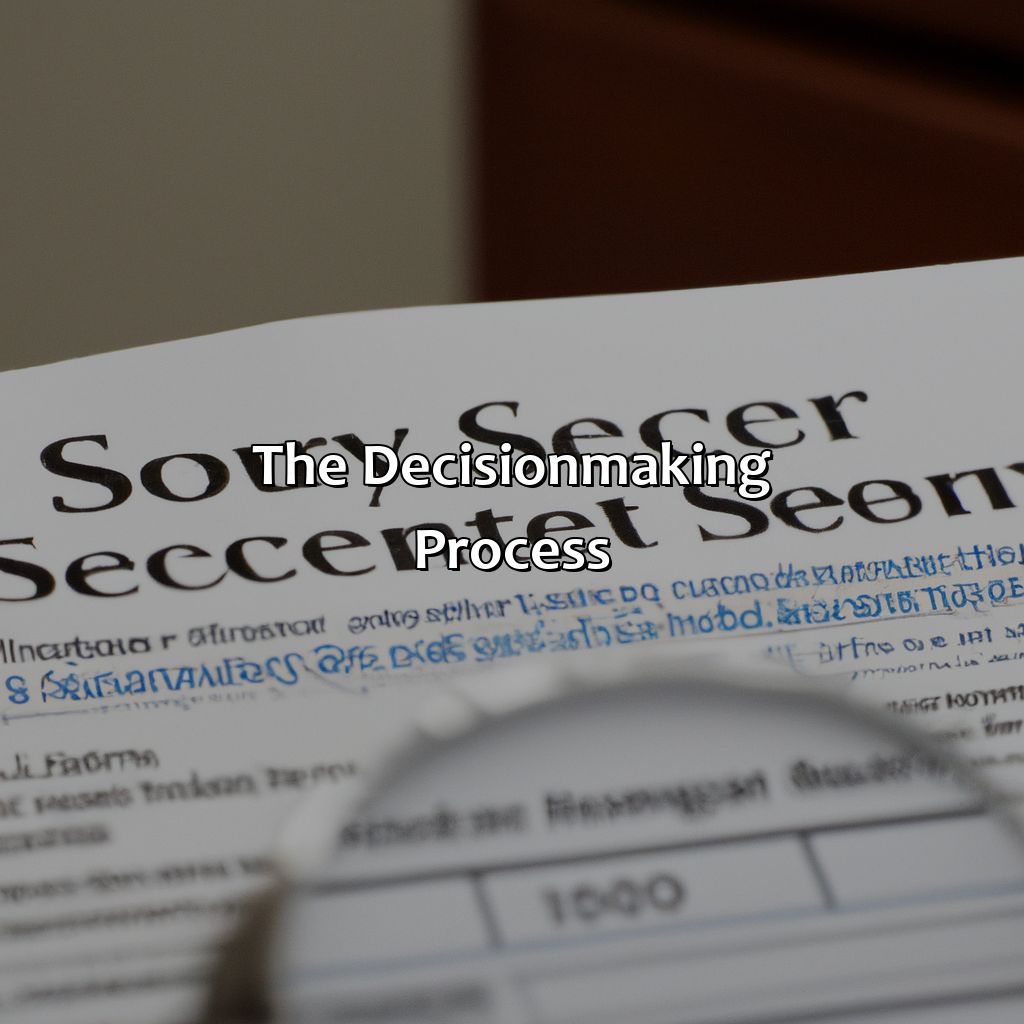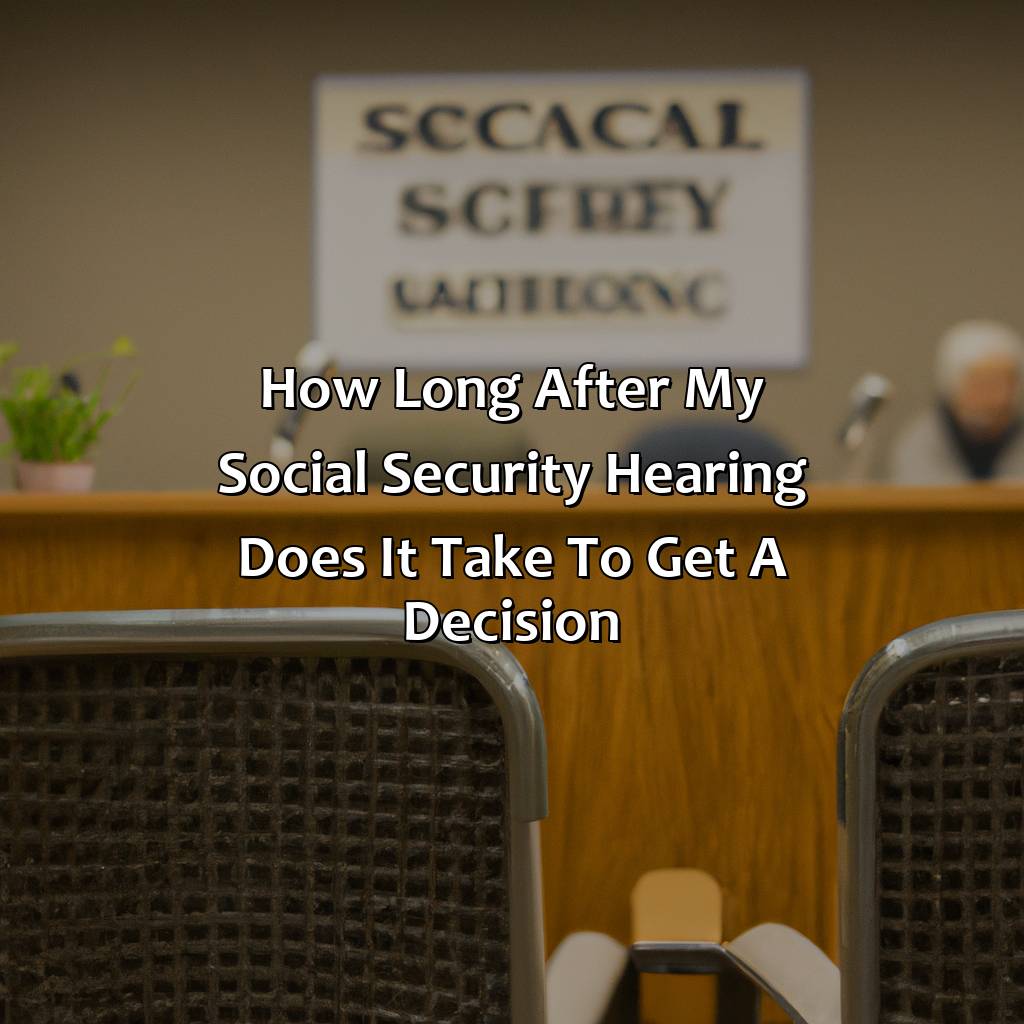How Long After My Social Security Hearing Does It Take To Get A Decision?
Key Takeaway:
- The time frame for receiving a decision after a social security hearing varies: The decision-making process can take several months or even longer depending on factors such as the complexity of the case, the availability of administrative law judges, and the backlog of pending cases.
- The decision is based on a thorough evaluation of medical evidence and vocational expert testimony: Administrative law judges review medical evidence to determine the extent of the claimant’s disability, and consider vocational expert testimony to determine whether the claimant can perform any work despite their disabilities.
- There are several possible outcomes of a social security hearing: The administrative law judge can approve the claimant’s application for benefits, deny the application, or choose to offer a “partially favorable” decision, which means the claimant is granted benefits but may receive less than they requested.
Are you waiting for a ruling on your Social Security disability claim? You’re not alone—finding out when and how you’ll receive a decision can be a lengthy and confusing process. Read on to learn how to navigate this process and get the decision you need.
Social Security Hearing – Overview
A Brief about Social Security Hearing
A Social Security Hearing is a legal process through which individuals who have been denied disability benefits have the chance to present their case to an Administrative Law Judge (ALJ) in order to receive a favorable decision. During the hearing, the ALJ evaluates evidence that has previously been submitted and hears testimony from the claimant and any witnesses they may have. The hearing is critical to the outcome of the case, as it is the last opportunity for the claimant to provide additional evidence and make arguments in support of their claim.
The Process after Social Security Hearing
After the Social Security Hearing, the Administrative Law Judge will review all the testimony and evidence presented during the hearing. Generally, it takes around 45 to 75 days for the judge to render a decision. However, the exact duration may vary depending on various factors such as the Judge’s caseload, complexity of the case, and any additional medical evidence that the Judge wishes to consider. Once the judge makes a decision, both the claimant and the Social Security Administration will be sent a copy of the decision.
Pro Tip
Ensure you and your representative (if any) are prepared for the hearing. Be sure to bring all the necessary documents, including medical records, doctor’s diagnoses, and any evidence that supports your disability claim. Furthermore, it’s important to collaborate with a reputable Social Security Disability Lawyer or Representative as they can prepare you for what to expect during the hearing and increase your chances of receiving favorable outcomes.

Image credits: retiregenz.com by James Woodhock
The Decision-Making Process
Focus on the Evaluation of Medical Evidence, Vocational Expert Testimony, and Disability Determination Services Review. This will give you an insight into the decision-making process.
The sub-sections will provide info on the steps for evaluating your case. See if you meet the requirements for disability benefits.

Image credits: retiregenz.com by Joel Duncun
Evaluation of Medical Evidence
Medical Evidence Assessment for Social Security Hearings
During a social security hearing, the medical evidence submitted is thoroughly evaluated before making the decision. The process involves analyzing the quantity and quality of medical reports, including physician’s notes, hospital records, lab results, and imaging studies. The administrative law judge will scrutinize the medical evidence carefully by reviewing all detailed descriptions of diagnoses, including objective test results that support them. They will examine not only the applicant’s current status but also assess how their conditions impact their ability to perform daily activities as well as personal and work-related tasks.
One crucial aspect of evaluating medical evidence is considering various factors like credibility, consistency with other available data, relevancy to disability claims, and treating source opinions.
It is essential to provide enough evidence to prove every impairment listed on your application or appeal fully. With that in mind, providing a complete list of all treatment sources along with any medications taken should be provided.
“Stories about friends who have won their SSDI appeals detailed several important points regarding what legal documents they submitted in order to qualify for Social Security Disability Income (SSDI).”
If you thought watching paint dry was boring, just wait till you hear a Vocational Expert’s testimony.
Vocational Expert Testimony
For Social Security disability hearings, a specialist in Vocational Rehabilitation may testify about your work history and any transferable skills. This evidence helps the Judge determine if there are other jobs you can perform. The Vocational Expert’s testimony is based on their experience, education, and knowledge of the job market. They will consider your ability to do the work based on medical limitations and functional capacity limitations described by a medical provider.
The expert’s testimony is influential to the judge. Therefore, it is important to discuss with your disability attorney how you can challenge or support their conclusions in advance of the hearing. You and your attorney can question them under oath during the hearing.
Remember that during Social Security Disability hearings, decisions may take between 1-3 months from submission date after all papers have been filed electronically or manually. Keep an eye for this decision as some decisions have deadlines within which an appeal must be made else its missed!
Why wait for a rollercoaster ride when you can experience the ups and downs of the Disability Determination Services Review?
Disability Determination Services Review
After submitting a disability claim, people often wonder about the timeframe for receiving a decision from the Social Security Administration. The process varies depending on several factors, such as the complexity of your medical condition and any backlog that may exist in the system.
Once your case progresses to the Disability Determination Services stage, evaluators will review your medical records and conduct interviews with you and your healthcare team. Following this assessment, it typically takes between one and three months to receive a decision regarding your eligibility for benefits.
During the Disability Determination Services review, evaluators will consider several factors when making their decision. These might include your physical or mental impairment’s severity, how long you have lived with it, and what treatments you have tried in the past. They will also assess whether or not you can still earn an income despite your disability. Any documentation or statements from healthcare providers detailing limitations caused by your impairment can be useful in this evaluation.
It is worth noting that 67% of all applications are denied at the initial level of review; however, more than half of these cases are later approved at subsequent stages of appeal. This means that even if you do receive an unfavorable decision after going through Disability Determination Services review initially, you may still be eligible for benefits after pursuing further appeals.
According to recent data collected by NOSSCR (National Organization of Social Security Claimants’ Representatives), roughly 70% of hearing cases were decided within six months during fiscal year 2020.
Time flies when you’re waiting for a social security decision, but factors like workload and complexity can slow it down to a crawl.
Factors That Affect the Time Frame
To grasp the timeline of social security hearing decisions, various factors must be taken into account. We’ll discuss the intricacies of the case and the availability of administrative law judges. Plus, we’ll look at the effect of the backlog of unresolved cases on the timeline.

Image credits: retiregenz.com by Harry Washington
Complexity of the Case
The intricacies of an individual’s case can significantly affect the duration it takes to receive a decision after a social security hearing. Factors such as medical complexity, legal arguments, and the amount of evidence presented can all contribute to a lengthier process. The more complicated the situation is, the longer it may take for an administrative law judge to review and come up with a ruling. However, simple cases may have expedited timelines.
It’s important to note that each case has its unique characteristics, which can impact decision timing. For example, if expert witnesses are required to provide additional opinions on certain matters or if legal representatives request further documentation or clarification from their clients during the hearing process.
Pro Tip: It’s best to consult with a lawyer experienced in Social Security Disability law before your hearing, as this can help you prepare and potentially save time in receiving your decision.
Finding an available administrative law judge is like trying to spot a unicorn in a sea of ponies.
Availability of Administrative Law Judges
Access to Judges and its Impact on the Processing of Social Security Disability Claims
The availability of administrative law judges is one of the factors that affects how long it takes to get a decision after participating in a social security hearing. A shortage of administrative law judges can lead to longer wait times for decisions, while a surplus may help expedite the process.
Additionally, access to administrative law judges varies by region, with some areas experiencing higher demand for hearings than others. This can impact the availability of judges and contribute to delays in the decision-making process.
It’s important to be aware of these factors when filing a social security disability claim and participating in a hearing. Ensuring that all necessary documentation is provided and being prepared for the hearing can help minimize delays caused by judge availability.
Don’t let common delays hold up your claim any longer. Take action today by preparing yourself for the hearing process and submitting all necessary documentation as soon as possible. Your future well-being depends on it.
After reading about the backlog of pending cases, I’m starting to think that the phrase ‘justice delayed is justice denied‘ was specifically written for social security hearings.
Backlog of Pending Cases
The pileup of Waiting Cases.
The hearings conducted by the Social Security Administration may take a while to reach a decision. One determinant of how long it takes for the verdict is related to the volume of pending cases. In recent times, there has been a significant backlog in pending cases awaiting resolution.
According to recent statistics, the backlog was estimated at about 1.2 million at the close of 2020. Those figures have demonstrated worsened performance in the agency’s efforts in clearing unclosed applications compared to past years. Procedural backlogs have primarily resulted from various concerns like Covid-19 protocols and administrative delays.
Such issues could arise despite SSA’s constant reviews & quality trials aimed at determining an appropriate amount of employees valid enough to cope with all presented lawsuits adequately and on schedule.
In early 2019, SSDI waiting times reached over two years due to disparities in processing claims digitally, and that figure continues to increase every year, exacerbating concerns around applicants’ financial difficulties associated with possible retroactive payments once their applications are established as correctly filled out.
Waiting for a social security decision is like waiting for your turn at a crowded DMV, except the stakes are higher and the chairs are less comfortable.
Average Waiting Time
Waiting Period for Social Security Hearing Decision
The Social Security hearing process usually takes several months after submitting your appeal. During this period, the Social Security Administration (SSA) will review your case and determine whether to approve or deny your benefits. On average, claimants wait around 60-90 days to receive a decision after the hearing.
The timeframe for a decision may vary depending on several factors such as the workload of the administrative law judge, the complexity of your case, and the availability of medical records. It’s important to note that some cases may take longer than others, but it’s essential to remain patient and keep track of any updates in your case.
It’s crucial to understand the waiting period for a decision as it can impact your financial stability and healthcare coverage. The SSA will contact you by mail once a decision is made, and it’s recommended to consult with a legal professional to review your benefits and potential options.
In the past, some claimants reported waiting for over a year before receiving an appeal decision. However, the SSA has taken significant steps to reduce processing times and improve the efficiency of the hearing process. By providing accurate and up-to-date information, you can help expedite the decision process and receive your benefits as soon as possible.

Image credits: retiregenz.com by Adam Duncun
Possible Outcomes of a Social Security Hearing
A social security hearing can have several potential outcomes that impact your eligibility for benefits. The judge may award you benefits, deny your claim outright, or remand the case for additional review. If benefits are awarded, they may be awarded in full or in part. The decision may also include a date when your benefits will begin. It’s important to note that the outcome of your hearing may depend heavily on the evidence presented, and how well it supports your case.
It’s possible that even after your hearing, you may not receive a decision for several weeks or even months. While it can be frustrating to wait for a decision, it’s important to remain patient and maintain contact with the SSA. During this time, you may be asked to provide additional documentation or information to support your claim.
Pro Tip: In order to increase the likelihood of a favorable outcome, it’s important to ensure that all documentation is complete and accurate prior to the hearing. You may also want to consider hiring an experienced attorney to represent you during the hearing process.

Image credits: retiregenz.com by Adam Duncun
Five Facts About How Long After My Social Security Hearing Does It Take To Get A Decision:
- ✅ The average processing time for a Social Security hearing decision is approximately 270 days. (Source: Social Security Administration)
- ✅ The processing time can vary depending on the complexity of the case and the workload of the hearing office. (Source: Disability Secrets)
- ✅ It is possible to request an expedited decision in certain circumstances, such as if the claimant is terminally ill. (Source: Social Security Administration)
- ✅ The hearing decision will be sent to the claimant and their representative, if applicable, by mail. (Source: Disability Benefits Center)
- ✅ The decision will include information on the amount of benefits awarded and how to appeal the decision if necessary. (Source: The Balance)
FAQs about How Long After My Social Security Hearing Does It Take To Get A Decision?
How long after my social security hearing does it take to get a decision?
The decision timeline for social security hearings can vary greatly depending on a number of factors. Though, typically, it takes around 2-3 months for the judge’s decision to come through once your hearing is complete.
What factors can delay a decision after a social security hearing?
Some of the most common factors that can delay a decision after a social security hearing include backlogs at the Social Security Administration, lack of medical evidence, and the need for further testing and medical evaluations.
Can I find out the status of my decision after a social security hearing?
Yes, you can most definitely find out the status of your decision after a social security hearing. This can be accomplished by contacting your local Social Security office or by checking the status of your case online.
If my case is denied after a social security hearing, what can I do?
If your case is denied after a social security hearing, you have the right to file an appeal. This is done by submitting an appeal request to the Social Security Administration within 60 days of the date of the hearing decision.
How can I increase the chances of getting a favorable decision after a social security hearing?
One of the best ways to increase the chances of getting a favorable decision after a social security hearing is to work with a qualified social security disability attorney. They can help guide you through the appeals process and ensure that you have the documentation and evidence needed to support your case.
Is it possible to receive a decision immediately after a social security hearing?
While it is possible to receive a decision immediately after a social security hearing, it is extremely rare. Most often, decisions come through within a few months of the hearing. However, it is worth noting that some cases can take up to a year or more for a decision to be issued.


